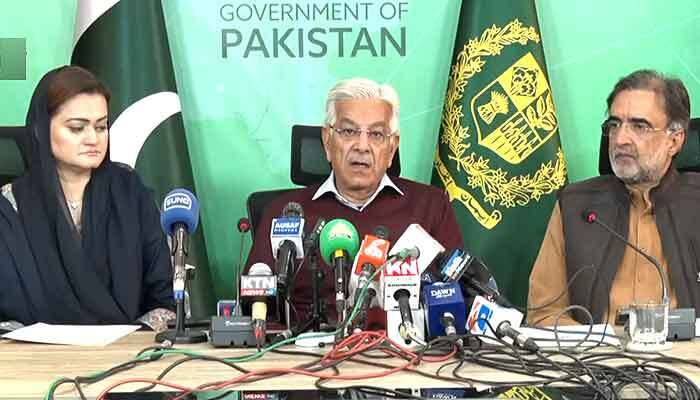Pakistan to shut down wedding halls 10pm, markets at 8pm to save energy
Eateries to close by 8pm too, defence minister says decisions will save Rs62 billion
ISLAMABAD: The government has announced its national energy-saving programme under which it has been decided that wedding halls will close by 10pm and markets at 8pm.
Defence Minister Khawaja Asif addressed a press conference flanked by Federal Minister for Information Marriyum Aurangzeb and Adviser to the Prime Minister on Kashmir Affairs Qamar Zaman Kaira after a meeting of the federal cabinet on Tuesday.
He said that it has been decided to close wedding halls at 10pm, while markets and restaurants will be closed at 8pm.
Markets around the world close by 6pm but ours are open till 2am, he added.
"If 20% of the workers are sent for work from home on rotational basis, this will save Rs56 billion," said the minister.
He also shared that the federal government was recommending switching street lights on alternately which will save about Rs4 billion.
"The government is also introducing e-bikes which will phase out the bikes that use petrol. The government is negotiating with the companies to phase out the bikes that use petrol and modify the existing bikes," said Asif.
The minister said that the government is reaching out to all four provinces to inform them about the policy and take them on board. He said that it is a national programme and will be launched with consensus.
The exercise will be completed in the next two days, he added.
Asif said that the country cannot afford the current living conditions as it is going through a serious economic situation.
"We need to change our habits if we want to live within our means," said the defence minister. He said austerity will be become part of the nation which will end its economic problems.
'Pakistan won't default'
Meanwhile, Adviser to PM Qamar Zaman Kaira assured that Pakistan will not default. He urged the people to accept the government's policy.
"The biggest issue of Pakistan is the import bill which is $26 to $28 billion and it keeps increasing. There is no other option for us than to take these steps and the nation will have to cooperate with the government," said Kaira.
Govt working out plan to reduce circular debt
Last week, sources had told The News that the government, without allowing an upward revision in electricity and gas tariffs, had directed the relevant authorities to come up with viable plans to reduce the monster of circular debt that had now peaked at Rs4 trillion.
However, without pricing adjustments, the International Monetary Fund (IMF) has rejected the initial plan for slashing the circular debt shared by Pakistani authorities with them in recent days because the Fund wants cost recovery of electricity and gas generation sectors.
Sources had told The News that Dar had chaired a high-level meeting to deliberate upon the cash-bleeding energy sector to prepare a plan for slashing down the circular debt, which would be presented to Prime Minister Shehbaz Sharif for approval.
Afterwards, this revised-updated plan was to be shared with the IMF. But the meeting with the PM was postponed.
The IMF high-ups assured the Pakistani authorities that they would continue holding virtual meetings during the Christmas holidays and Pakistani authorities were assigned to come up with a viable plan to erase the circular debt.
The IMF had expressed its annoyance that the circular debt of the power sector had not shown improvements sought on the occasion of completion of the seventh and eighth reviews under the Extended Fund Facility (EFF) programme. The IMF’s displeasure further grew when the circular debt of the gas sector jacked up to Rs1,600 billion.
-
Bitcoin plummets toward $60,000 as investors dump risky bets
-
Bitcoin crashes below $63K as regulatory pressure and market fears grow
-
Bitwise Crypto Industry innovators ETF: What investors should do in 2026?
-
Nintendo shares slide again as momentum fears grow
-
Gold, silver prices fallen sharply; What’s driving the drop?
-
Gold’s record climb: Experts question if its safety is ‘overstated’
-
Dubai unveils plans to construct street built with real gold
-
Netflix slams Paramount’s bid: 'Doesn't pass sniff test’ as Warner battle escalates












